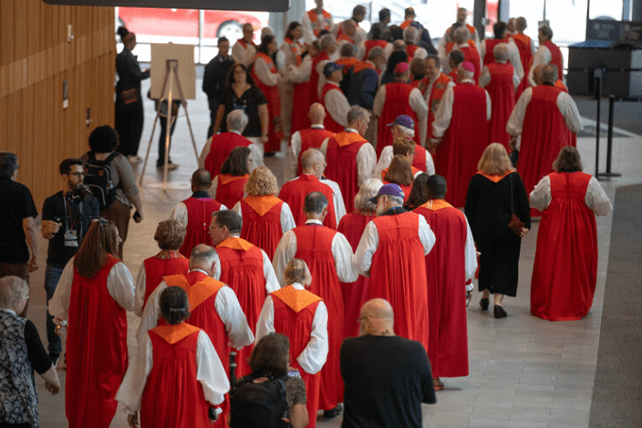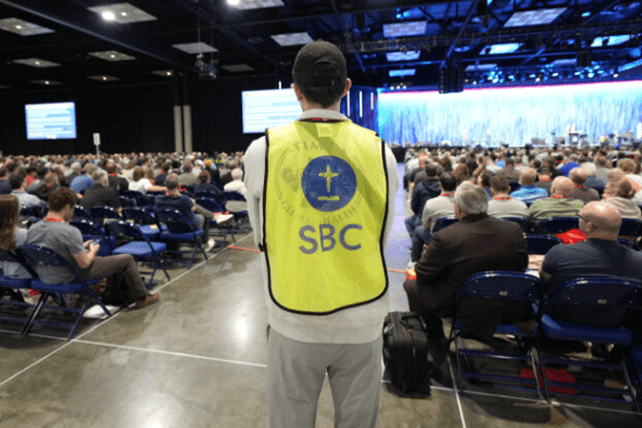(RNS) — As it elected Bishop Sean Rowe its new presiding bishop at last week’s General Convention in Louisville, Kentucky, the Episcopal Church adopted more than 20 resolutions related to Title IV, a section of the church bylaws that governs its response to allegations against clergy of abuse or misconduct.
Over the past year, a spate of public Title IV cases prompted concerns about the complexity and effectiveness of the denomination’s approach to clergy discipline, particularly in cases involving bishops’ decisions or misconduct of their own. Less than two weeks before General Convention, the denomination disclosed that three of the five presiding bishop nominees had faced current or prior Title IV complaints. (Rowe was one of the two nominees not listed in the disclosure.)
“There’s been a lot of activity and action of distrust by the wider church, in the way Title IV has been adjudicated with bishops,” said Bishop Ian T. Douglas, retired bishop of Connecticut. He added that some bishops, on the other hand, are concerned that they might be unfairly targeted. “I think, and I hope and I pray that these changes can help rebuild trust in the system,” he said.
Some hope that the election of Rowe, who has procedural expertise and a history of bringing abuse to light as bishop of Northwestern Pennsylvania and Western New York, signals a broader shift toward a more streamlined, consistent application of Title IV.
Douglas, for one, noted that Rowe is an expert on the church’s bylaws and has years of experience chairing committees that make recommendations on Title IV. In 2010, Rowe revealed that sexual abuse allegations had been made against his deceased predecessor in Northwestern Pennsylvania, and in 2018 he published an op-ed in The Christian Century about covering up abuse in the church.
“Protecting the church, its reputation, and the vocations of clergy can no longer be more important than developing accessible, transparent procedures through which clergy and bishops are held accountable,” wrote Rowe, who, as presiding bishop, will play a key role in Title IV cases involving bishops.
While the changes to Title IV are by no means an overhaul, the technical adjustments, most of which will go into effect in January, are designed to improve fairness of the process for everyone involved, according to Christopher Hayes, a lawyer who chaired the Standing Commission on Structure, Governance, Constitution and Canons, which proposed resolutions on Title IV.
Some of the changes address Title IV’s discipline of bishops, which some in the wider church say has been too lenient. Last week’s General Convention voted to more closely align the Title IV process for bishops with that of other clergy, in particular extending to bishops a provision that ends their “pastoral relationship” with their dioceses by default if they are suspended for misconduct for longer than six months.
A separate resolution adjusts the composition of the board that hears complaints against bishops so that it has a slight minority, rather than a majority, of bishops.
“This rebalancing isn’t really because there is, in fact, an observed inequity, but there is a perceived inequity. And it’s that we are trying to respond to. We need to have a process that people believe is fair and careful,” Bishop Nicholas Knisely of Rhode Island, who chairs the disciplinary board for bishops, told Religion News Service. Knisely and Hayes served together on the Title IV Disciplinary Canons Committee.
The new resolutions also ensure each diocese has at least one intake officer — the first point of contact for those submitting complaints of abuse or harassment — who isn’t employed by the diocese and therefore isn’t under the auspices of the bishop. Intake officers will also be required to provide monthly updates to complainants and respondents. These reports, according to Nathan Brown, a lay representative who also served on the Title IV Disciplinary Canons Committee, could be one of the most impactful changes.
“By having monthly reports required and ensuring people are kept up to date on what’s going on, particularly early in process, and having that communication, I think that will provide much greater trust in the system and much greater transparency,” Brown told RNS.










 Tough Times Can Make Us Stronger and Wiser
Tough Times Can Make Us Stronger and Wiser















